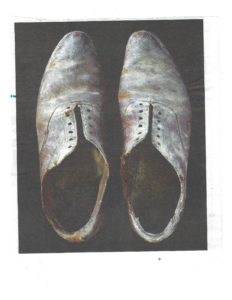There is no poet I enjoy as much as Emily Dickinson. She was born in Amherst, Massachusetts and lived there her whole life from 1830-86). Although she is one of the most important figures in English literature, only about ten of her poems were published in her lifetime. Most of these were published either anonymously or without her knowledge. She was living at a time when women writers were discouraged from publishing their works. Nathaniel Hawthorne called women’s writing and poetry, “scribbling.” Emily has been erroneously described as a recluse. Although she didn’t do much to promote her poems, she was close to several family members and a few friends, such as Ralph Waldo Emerson and Elizabeth Barrett Browning. However, the majority of her 1800 poems were published posthumously. They were found in a shoe box, bundled together in groups, she had apparently intended to send to her friends, by her sister Lavinia Dickinson. Below, see her “Letter to the World,” which she, apparently, thought might be published after she died:
This is my letter to the world
That never wrote to me,–
The simple news that Nature told,
With tender majesty.
To hands I cannot see;
For love of her, sweet countrymen,
Judge tenderly of me!
I judge her tenderly and revert to her inspirational, though often challenging works again and again. She wrote in a style that is unlike other writers of her period, or perhaps any period. Although many of her poems are difficult to fully comprehend, some of them have meanings which are so clear that they pierce the soul of many readers. The following poem, which I shall call’ “A Precious Mouldering Pleasure,” is plainly about Dickinson’s love of books written centuries before her time, in a period “when all of our dreams come true.”
Emily Dickinson writes,
A PRECIOUS, mouldering pleasure ’t is
To meet an antique book,
In just the dress his century wore;
A privilege, I think,

His venerable hand to take, (5)
And warming in our own.
A passage back, or two, to make
To times when he was young.
His quaint opinions to inspect,
His knowledge to unfold (10)
On what concerns our mutual mind,
The literature of old;
What interested scholars most,
What competitions ran
When Plato was a certainty, (15)
And Sophocles a man
When Sappho was a living girl.
And Beatrice wore
The gown that Dante deified.
Facts, centuries before, (20)
He traverses familiar,
As one should come to town
And tell you all our dreams come true:
He lived where dreams were born.
His presence is enchantment, (25)
You beg him not to go;
Old volumes shake their vellum heads,
And tantalize, just so.

Dante Meets Beatrice in the Divine Comedy
In line 3, Dickinson describes her love of old books which give us a window “into the dress his century wore.” She personifies and elevates a book which allows her to see how people lived in olden times. Reading an inspiring book that was written during the time that the artist created it, gives her a sense of being able to be present and understand the culture, lifestyles, hopes, and struggles of a previous time. As her poem progresses, she specifically narrows her focus down to the thirteenth century, when the Italian poet, Dante Alighieri loved and deified the beautiful Beatrice Portinari, in The Divine Comedy. Dickinson is wistfully pining, not only to get a glimpse into the period where Dante and Beatrice lived, but imagining that she can enter that sacred space herself. In lines 23-24 she refers to that ancient time as the period “where all of your dreams were true” and “where dreams were born.” So enraptured is Dickinson in this vision, that she “begs him not to go” (line 26). We may only imagine what Emily was thinking when she transported her soul to this period. Was she wishing that another poet or lover might have doted on her like Dante did on Beatrice, or was she referring literally to her love of literature? Perhaps the poem evoked both images in her mind? As she concludes in the final line, books and poems “tantalize, just so.” We are left with reconsidering the meaning of her first line, “A Precious Mouldering Pleasure.” What memory or feeling about reading about Dante was still “mouldering” for her? Perhaps some readers of this posting might have an opinion on this question.
As we read these two intriguing Dickinson poems above, or other classic poems or books, we may also become enchanted and transported to the worlds they created through their words. In “A Precious Mouldering Pleasure, we are looking back at Dickinson looking back at a period about five-hundred years before her lifetime. Yet, it still held meaning for her. I have often been inspired by many great poems and works of literature from previous time periods. I particularly love poems and books either written in the style of the Victorian era. However, I consider any well-written poem or book as a “privilege” reserved for the curious and considering reader. I cannot say that I am always as transfixed as Dickinson, but I cannot help going back to a great work of literature from another time. It not only teaches me a lot about the dreams and hopes of the period but informs me about how I am and who I wish to become. Please respond to bluemur@litchatte.com or ellisonms2@vcu.edu to express what a great book or poem has meant to you.



